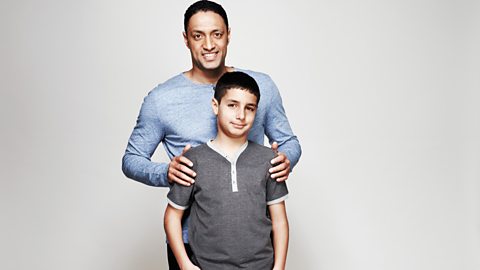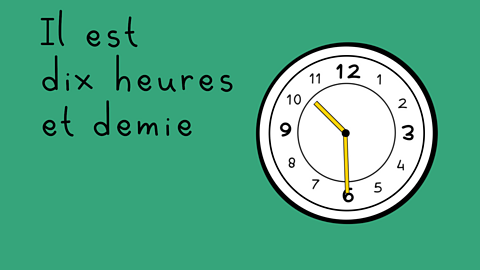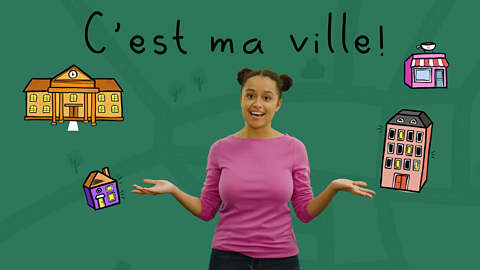Describing people in French
When youāre describing how you or other people look or are - then ĆŖ³Ł°ł±š - the āverb to be is a good place to start.ā
Je suis - I am or elle est - she is.ā
Je suis grand - I am ³Ł²¹±ō±ō.ā
Elle est petite - She is small.ā
Je suis sportif - I am sporty. ā
āElle est contente - She is happy.ā
Then itās good to be able to say what people have using the verb avoir - to āhave.
Āįāa¾± - I have
elle a - she has.
Jāai les cheveux longs - I have long hairā.
Elle a les yeux bruns - She has brown eyes. ā
Then you can say what you wear using porter - to wearā.
āje porte - I wear.
elle porte - she wears.
Je porte des lunettes - I wear glasses.
Elle porte un foulard - She wears a headscarf.ā
So with ĆŖ³Ł°ł±š - to be, avoir - to have or porter - to wear you can say a lot about āyourself or other people.ā
Describing peopleās height
To describe peopleās size, use a form of ĆŖ³Ł°ł±š (to be) and then the adjective, which usually āchanges its ending depending on whether the person is masculine or feminine.ā
- Mon pĆØre est grand - My dad is ³Ł²¹±ō±ō.ā
- Ma mĆØre est grande - My mum is ³Ł²¹±ō±ō.ā
- Ma sÅur est de taille moyenne - My sister is medium height.ā
- Mon demi-frĆØre est petit - My step-brother is ²õ³ó“Ē°ł³Ł.ā
- Ma grand-mĆØre est petite - My grandmother is ²õ³ó“Ē°ł³Ł.ā

Image caption, Mon pĆØre est grand
1 of 5
You can use intensifiers (words that add āforceā to an adjective) such as ā³Ł°łĆزõ (very) and assez (quite) to add more information.ā
- Je suis ³Ł°łĆزõ grand(e) - I am very ³Ł²¹±ō±ō.ā
- Mon grand-pĆØre est assez petit - My grandfather is quite ²õ³ó“Ē°ł³Ł.ā
Comparing peopleās heights
To compare two people, use the following sentence structure:ā
| Person one + a form of ĆŖ³Ł°ł±š (to be)ā | more / less + adjective | ³Ł³ó²¹²Ō/²¹²õā | person twoā |
|---|---|---|---|
| Je suis (I am) | plus grand(e)ā ā(³Ł²¹±ō±ō±š°ł)ā | que ā(³Ł³ó²¹²Ō)ā | mon frĆØre (my brother)ā |
| Ma sÅur est (My sister is) | moins grande āā(less tall / not as tall)ā | que ā(³Ł³ó²¹²Ō/²¹²õāā)ā | ma mĆØre (my mum)ā |
Describing hair
To talk about your hair, use a form of avoir (to have), followed by les cheveux (hair) and āthen give the colour or another adjective to describe your hair.
- Jāai les cheveux bruns - I have brown hair.ā
- Il a les cheveux bruns et “Ś°ł¾±²õĆ©²õ - He has brown, curly hair. ā
If you want to use more than one adjective to describe your hair, use et before the last āadjective:ā
- Jāai les cheveux blonds, longs et ²ś“Ē³Ü³¦±ōĆ©²õ - I have long, blond, wavy hair.ā
The adjectives all need to have an āsā on the end, as les cheveux is masculine and plural, āexcept roux and gris, as they donāt change when masculine and plural.ā
| French | ·”²Ō²µ±ō¾±²õ³óā |
|---|---|
| j'ai les cheveux ā¦ | āI have ā¦ hair |
| il / elle a les cheveux ā¦ā | he / she has ā¦ hair |
| bruns | brown |
| noirs | black |
| roux | red / ginger |
| blonds | blond |
| gris | grey |
| longs | long |
| courts | short |
| raides | straight |
| ²ś“Ē³Ü³¦±ōĆ©²õ | wavy |
| “Ś°ł¾±²õĆ©²õ | curly |
Describing eye colour
To talk about eye colour, use Āįāa¾± (I have) or il a/elle a (he has/she has), followed by les āyeux (eyes) and then give the colour.ā
The adjectives all need to have an āsā on the end, as les yeux is masculine and plural, āexcept marron, noisette and gris, as they donāt change when used in the masculine and āplural.ā
- Jāai les yeux verts - I have green eyes.ā
- Jāai les yeux marron - I have brown eyes.ā
| French | English |
|---|---|
| Āįāa¾± les yeux ā¦ā | I have ā¦ eyes |
| il / elle a les yeux ā¦ā | he / she has ā¦ eyes |
| bleus | blue |
| marron | brown |
| verts | green |
| gris | grey |
| noisette | hazel |
Describing other features
There are lots of other things you can say about someoneās appearance. Here are a few āmore examples:ā
| French | English |
|---|---|
| Āįāa¾± des taches de rousseur | I have freckles |
| je porte des lunettes | I wear glasses |
| je porte le hijab / je porte le voile | I wear a hijab / headscarfā |
| je porte un turban | I wear a turban |
| il a une barbe | he has a beard |
| il a une moustache | he has a moustache |
| il est chauve | he is bald |
Describing personalities
There are lots of adjectives you can use to talk about peopleās personalities.
Most adjective endings change depending on whether the person you are talking about is āmale or female. āUsually, you add an āeā to the adjective to describe a female person: ā
- Mon copain, qui sāappelle Nabil, est amusant et ³Ł°łĆزõ bavard - My (male) friend, āNabil, is funny and very chatty.ā
- Ma copine, qui sāappelle Anya, est amusante et ³Ł°łĆزõ bavarde - My (female) friend, āAnya is funny and very chatty.ā
Sometimes, you need to change the last consonant and add an āeā to make an adjective āfeminine. With some adjectives, you have to double the consonant and add an āeā.ā
- Mon copain, qui sāappelle Nabil, est gentil et ³Ł°łĆزõ sportif - My (male) friend, Nabil, āis kind and very sporty.ā
- Ma copine, qui sāappelle Anya, est gentille et ³Ł°łĆزõ sportive - My (female) friend, āAnya is kind and very sporty.ā
Some adjectives donāt change when they are feminine.ā
- Mon copain, qui sāappelle Nabil, est sympa et ³Ł°łĆزõ »å°łĆ“±ō±š - My (male) friend, Nabil, āis nice and very funny.ā
- Ma copine, qui sāappelle Anya, est sympa ³Ł°łĆزõ »å°łĆ“±ō±š - My (female) friend, Anya is ānice and very funny.ā
Here are some great adjectives you can use to describe peopleās personalities:ā
| Masculine | Feminine | English |
|---|---|---|
| amusant | amusante | funny / fun |
| bavard | bavarde | chatty |
| ¾±²Ō³ŁĆ©°ł±š²õ²õ²¹²Ō³Ł | ¾±²Ō³ŁĆ©°ł±š²õ²õ²¹²Ō³Łe | interesting |
| strict | stricte | strict |
| sportif | sportive | sporty |
| ³¦°łĆ©²¹³Ł¾±“Ś | ³¦°łĆ©²¹³Ł¾±ve | creative |
| travailleur | travailleuse | hard-working |
| paresseux | paresseuse | lazy |
| ennuyeux | ennuyeuse | boring |
| gentil | gentille | kind |
| sympa | sympa | nice |
| »å°łĆ“±ō±š | »å°łĆ“±ō±š | funny |
Quiz
Watch the video and find out how much you know about describing people in French in this short quiz.ā
MICHEL: Aah, merciā¦ā.
“”²ŃĆ³¢±õ·”: Je suis ³Ł°łĆزõ contente d'ĆŖ³Ł°ł±š dans la nouvelle classe.
MICHEL: **Ah oui, moi aussi je suis content.**ā
“”²ŃĆ³¢±õ·”: **Oui. Il y a de nouveaux Ć©tudiants cette annĆ©e.**ā
MICHEL:ā Cāest vrai. Tu as rencontrĆ© Georges?ā
“”²ŃĆ³¢±õ·”: Ahhhā¦ Georges?
MICHEL: **Oui. Il est assez grand avec les cheveux bruns. Tu le connais?**ā
“”²ŃĆ³¢±õ·”: Ah oui, Āįāa¾± rencontrĆ© Georges. Il est ³Ł°łĆزõ sympa.
MICHEL: **Cāest lui.**ā
“”²ŃĆ³¢±õ·”: Cāest le frĆØre de FranƧoise. Tu connais FranƧoise?ā
MICHEL: **Oui, Je la connais. Elle aussi est ³Ł°łĆزõ sympa.**ā
“”²ŃĆ³¢±õ·”: Tu sais que Georges and FranƧoise sont jumeaux?
MICHEL: Non! Ce nāest pas vrai!
“”²ŃĆ³¢±õ·”: **Oui cāest vrai.**ā
MICHEL: Elle a les cheveux roux et des taches de rousseur.
“”²ŃĆ³¢±õ·”: Et Georges a les cheveux bruns et les yeux bleus.
MICHEL: Elle est travailleuse ā¦ā
“”²ŃĆ³¢±õ·”: **Tu as raison.**ā
MICHEL: Ils sont si diffĆ©rents. FranƧoise est silencieuse et ā¦
“”²ŃĆ³¢±õ·”: **ā¦ et Georges est bavard.**ā
MICHEL: Jāaime beaucoup Georges.
“”²ŃĆ³¢±õ·”: **Moi aussi. Je lāaime beaucoup.**ā
MICHEL: **Cāest Georgesā¦ AllĆ“? Oh bonjour Georges. Tu veux venir chez AmĆ©lie? Je suis ici avec elle.**ā
MICHEL: Cāest Georges! Il vient maintenant.
“”²ŃĆ³¢±õ·”: Super - je suis contente! Georges est trop »å°łĆ“±ō±š! ā
Translation :
MICHEL: Ah, thanks.
“”²ŃĆ³¢±õ·”: Iām really happy to be in the new class.
MICHEL: Ah yes, Iām happy too.
“”²ŃĆ³¢±õ·”: Yes. There are some new students this year.
MICHEL: Itās true. Have you met George?ā
“”²ŃĆ³¢±õ·”: Errr ā¦ George?ā
MICHEL: Yes. Heās fairly tall with brown hair. Do you know him?ā
“”²ŃĆ³¢±õ·”: Oh yes, Iāve met George. Heās very nice.ā
MICHEL: Thatās him.
“”²ŃĆ³¢±õ·”: Heās Francoiseās brother. Do you know Francoise?ā
MICHEL: Yes, I know her. Sheās also really nice.
“”²ŃĆ³¢±õ·”: You know that George and Francoise are twins?ā
MICHEL: No! Really?ā
“”²ŃĆ³¢±õ·”: Yes, itās true.
MICHEL: She has red hair and freckles.
“”²ŃĆ³¢±õ·”: ā¦ And George has brown hair and blue eyes.ā
MICHEL: She is hard-working ā¦ā
“”²ŃĆ³¢±õ·”: Youāre right.ā
MICHEL: They are so different. Francoise is quiet and ā¦ā
“”²ŃĆ³¢±õ·”: ā¦ and George is chatty.ā
MICHEL: I really like George.
“”²ŃĆ³¢±õ·”: Me too. I like him a lot.
MICHEL: ā(To Amelie) Itās George. Hi, hello George. Do you want to come over to AmĆ©lieās house? Iām here āwith her ā¦ā.
MICHEL: Itās George. Heās coming now.
“”²ŃĆ³¢±õ·”: Great! I'm happy. George is too funny!ā
Game - FestiLingo: French. game
Visit the festival and practise French language skills in this game

More on Topics
Find out more by working through a topic
- count4 of 9

- count5 of 9

- count7 of 9
